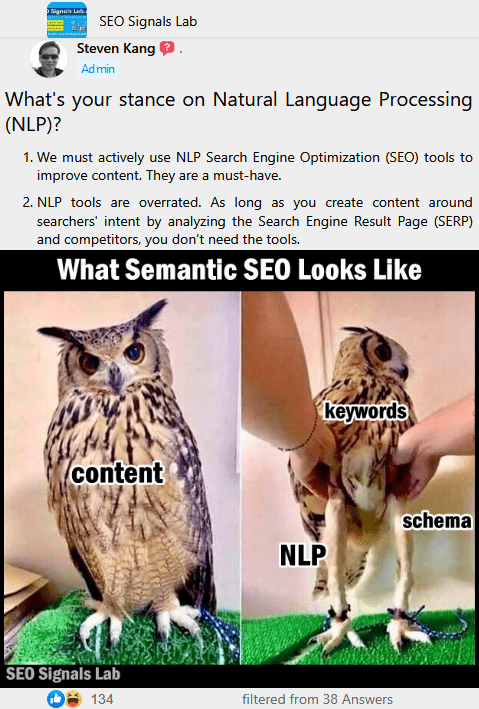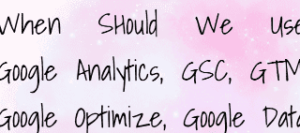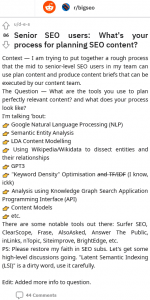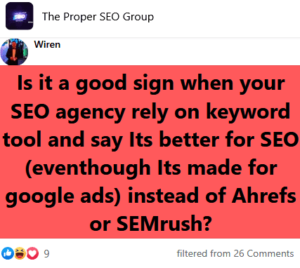Steven Kang 👑
What's your stance on Natural Language Processing (NLP)?
We must actively use NLP Search Engine Optimization (SEO) tools to improve content. They are a must-have.
NLP tools are overrated. As long as you create content around searchers' intent by analyzing the Search Engine Result Page (SERP) and competitors, you don't need the tools.
79 👍🏽 53 🤭 134
[filtered from 38 Answers]

Dolman
#3 – Natural Language Processing (NLP) tools are overrated.
As long as you focus on the searchers' intent by analyzing the keywords they use to search, the entities they add to them as keyword modifiers, and write content to satisfy the underlying search demand, you don't need the tools.
💟👍🏽10
Jenks
Let's not be SEO snobs.
If you have a local client or a low competition niche, simply using a tool that extracts Natural Language Processing (NLP) data, ensuring you're focused on competitors with the same intent… you're going to get results. Especially if you're doing some clustering, internal linking etc.
I've hundreds and hundreds of results doing this. It's easy, quick and the writers do a good job because they understand what you want from them.
If you are in more competitive niches, then you're either going to have to be a lot more detailed with your NLP analysis and get really granular and use tools that allow that (which most of the general lower end tools don't) or create a hub on content with a shit load of content matching various LT search terms to dominate topical authority.
Which is more expensive, but if your niche has the Return on Investment (ROI) it's totally worth the investment. I recently worked for a Brand that knocked CANVA off #1 with this approach.
For local or low competition, content optimization tools work fine, if you are new to Search Engine Optimization (SEO) these tools are going to be sending you in the right direction until your knowledge evolves and you can make more informed decisions.
#3 – Natural Language Processing (NLP) tools are overrated.
As long as you focus on the searchers' intent by analyzing the keywords they use to search, the entities they add to them as keyword modifiers, and write content to satisfy the underlying search demand, you don't need the tools.
💟👍🏽10
Raef » Dolman
Do you think NLP can assist in analyzing searchers intent?
Dolman » Raef
The meaning of a word is its use in the language…
Raef » Dolman
But isn't that what NLP does best?
Dolman » Raef
The meaning of a word is its use in the language…
Using Natural Language Processing (NLP) as a tool to analyze the Search Engine Result Page (SERP) and competitors will allow you to approximate/mirror/mimic the supply, not the demand.
While that will help you approximate/mirror/mimic the current supply, it does not offer an accurate reflection of the underlying search demand, does not help you better understand the underlying search demand, nor does it help you identify the gaps that exist between their demand (needs, wants, desires, fears, issues, concerns, problems, issues) and the current supply you can exploit to generate rankings and drive traffic to your content/pages/website.
You shall know a word by the company it keeps…
Natural Language Processing and Search Intent Understanding C3 Conduc…
👍🏽1
Raef
I'm not talking about using it for demand or volume, but to determine what search terms indicate intention. Some NLP research I've seen will allow you to use a search term and evaluate the intention of variations of that search term. Then you could check for demand or volume.
Dolman » Raef
"determine which search terms indicate intention"…
All search terms have an intent, the crux of the matter is figuring out which bucket of intent they belong to.
"some NLP research I've seen will allow you to use a search term and evaluate the intention of variations of that search term"
Which research and tool? Links? References?
==========================
Word = player
What is the intention behind variations of that word?
If you entered the word "player" into a NLP tool, what would it tell you about the intent of its variants?
Whenever the word is "poker", "chess", "hockey" or "baseball", the intent when the word "player" is added to the query is the same – a request for information about the category of person who plays the game/sport in question.
Is that true of every use of the root keyword "player" as it's used in conjunction with other seed keywords?
What about "spotify web player"? Is "spotify web" a game or sport a "player" can play?
What about "vlc player", "mp3 player" or "adobe flash player"?
In the case of those examples the addition of the word "player" does not mean "a person who plays a game/sport" but a tool/software/application one can use to "play" audio or visual media, typically available in a digital format.
What about a "cd player", "blu ray player", "cassette player" or "record player"?
Is the search intent and underlying search demand the same when the seed keyword "player" is added to these root keywords or does it change to mean a device someone can use to "play" music or watch a movie on a physical device (DVD player, vinyl record player)?
Raef » Dolman
That's a simplistic example and no where near the capabilities of NLP. Sorry, but I refuse to disagree further.
Dolman » Raef
I don't disagree with your statement, but it is an example none the less.
Can you share links to the NLP research you mentioned earlier or offer a more complex example which can better illustrate the capabilities of NLP?
I don't think we're in disagreement on the matter as a whole and would appreciate any insights you can offer.
Raef » Dolman well, even in the slideshare.net link you provided, she talks about walking into a hardware store. That stages the context for the next question. Would a hardware store sell four candles? Maybe, but they most likely would sell fork handles. It all has to do with the overall context.
Again, in her slides, you wouldn't look for a book about soup in the automobile section in the library, right.
In an article about music, any reference to player, would be undoubtedly be interpreted as a music player and not a hockey player.
It's not a micro-analyzed term that's processed, it's processed in the context of the overall web page.
On page 34 she talks about "Understanding of user's context". In an article about Wayne Gretzky, any reference to player, would be first construed as a hockey player. Now if "The Great One" was listening to Metallica on CD, player would be taken from the context of intention of the surrounding words. So player would be the word home, and the words as the neighbors to that word home, would refine the intention of that use of the word player.
And, as you can see from this discussion between you and me, there is bias even in NLP and ML. I can read the same thing you do, but because I believe in NLP, I read different interpretations than you do. Is one of us right and the other wrong?
Nope. Just different perspective or bias.
Dolman » Raef
==============
well, even in the slideshare.net link you provided, she talks about walking into a hardware store. That stages the context for the next question. Would a hardware store sell four candles? Maybe, but they most likely would sell fork handles. It all has to do with the overall context.
==============
Four candles = 4 x candle (sold at hardware and other stores)
Fork handles = two Ronnie's fork handle sketch (not a physical entity), granny fork wooden handle (physical item for the kitchen), pitch fork handle (replacement item for another physical item sold primarily in hardware stores)
If the person is in a hardware store using these words when speaking to a hardware employee, the employee would likely assume they are looking for a pitch fork handle or four candles and either could be just as likely unless other information such as the age and dress of the person is known.
For example, a man in overalls is likely to want a pitch fork handle as opposed to a woman with a handbag who is likely to want candles in the sum of four.
Context and intent.
==============
Again, in her slides, you wouldn't look for a book about soup in the automobile section in the library, right.
==============
No, you would not. You would follow the clearly marked signs to find the automobile section in that part of the store, but should you be in a department store rather than a hardware store, the notion of being able to find a book with soup recipes wouldn't be as silly as originally proposed.
Context and intent.
==============
In an article about music, any reference to player, would be undoubtedly be interpreted as a music player and not a hockey player.
It's not a micro-analyzed term that's processed, it's processed in the context of the overall web page.
On page 34 she talks about "Understanding of user's context". In an article about Wayne Gretzky, any reference to player, would be first construed as a hockey player. Now if "The Great One" was listening to Metallica on CD, player would be taken from the context of intention of the surrounding words. So player would be the word home, and the words as the neighbors to that word home, would refine the intention of that use of the word player.
==============
Context and intent.
You shall know a word by the company it keeps…
==============
And, as you can see from this discussion between you and me, there is bias even in NLP and ML. I can read the same thing you do, but because I believe in NLP, I read different interpretations than you do. Is one of us right and the other wrong?
Nope. Just different perspective or bias.
==============
I didn't say I didn't believe in NLP.
If you want to write an article filled with NLP, you'll find a lot more useful information analyzing and interpreting the underlying search demand related to the topic you wish to rank than you will by analyzing the SERPs or your competitors.
SERP + competitor analysis + NLP = you can better understand the supply (approximation of the search demand)
keyword research + NLP = you can better understand the actual search demand, not just an approximation of it
Optimize for the demand, not the supply.
Raef » Dolman
I'm done.
Dolman » Raef » Raef » Dolman
And you as well.
Do you think NLP can assist in analyzing searchers intent?
Dolman » Raef
The meaning of a word is its use in the language…
Raef » Dolman
But isn't that what NLP does best?
Dolman » Raef
The meaning of a word is its use in the language…
Using Natural Language Processing (NLP) as a tool to analyze the Search Engine Result Page (SERP) and competitors will allow you to approximate/mirror/mimic the supply, not the demand.
While that will help you approximate/mirror/mimic the current supply, it does not offer an accurate reflection of the underlying search demand, does not help you better understand the underlying search demand, nor does it help you identify the gaps that exist between their demand (needs, wants, desires, fears, issues, concerns, problems, issues) and the current supply you can exploit to generate rankings and drive traffic to your content/pages/website.
You shall know a word by the company it keeps…
https://www.slideshare.net/…/natural-languagehttps://www.aclweb.org/anthology/I13-1063.pdfNatural Language Processing and Search Intent Understanding C3 Conduc…
👍🏽1
Raef
I'm not talking about using it for demand or volume, but to determine what search terms indicate intention. Some NLP research I've seen will allow you to use a search term and evaluate the intention of variations of that search term. Then you could check for demand or volume.
Dolman » Raef
"determine which search terms indicate intention"…
All search terms have an intent, the crux of the matter is figuring out which bucket of intent they belong to.
"some NLP research I've seen will allow you to use a search term and evaluate the intention of variations of that search term"
Which research and tool? Links? References?
==========================
Word = player
What is the intention behind variations of that word?
If you entered the word "player" into a NLP tool, what would it tell you about the intent of its variants?
Whenever the word is "poker", "chess", "hockey" or "baseball", the intent when the word "player" is added to the query is the same – a request for information about the category of person who plays the game/sport in question.
Is that true of every use of the root keyword "player" as it's used in conjunction with other seed keywords?
What about "spotify web player"? Is "spotify web" a game or sport a "player" can play?
What about "vlc player", "mp3 player" or "adobe flash player"?
In the case of those examples the addition of the word "player" does not mean "a person who plays a game/sport" but a tool/software/application one can use to "play" audio or visual media, typically available in a digital format.
What about a "cd player", "blu ray player", "cassette player" or "record player"?
Is the search intent and underlying search demand the same when the seed keyword "player" is added to these root keywords or does it change to mean a device someone can use to "play" music or watch a movie on a physical device (DVD player, vinyl record player)?
Raef » Dolman
That's a simplistic example and no where near the capabilities of NLP. Sorry, but I refuse to disagree further.
Dolman » Raef
I don't disagree with your statement, but it is an example none the less.
Can you share links to the NLP research you mentioned earlier or offer a more complex example which can better illustrate the capabilities of NLP?
I don't think we're in disagreement on the matter as a whole and would appreciate any insights you can offer.
Raef » Dolman well, even in the slideshare.net link you provided, she talks about walking into a hardware store. That stages the context for the next question. Would a hardware store sell four candles? Maybe, but they most likely would sell fork handles. It all has to do with the overall context.
Again, in her slides, you wouldn't look for a book about soup in the automobile section in the library, right.
In an article about music, any reference to player, would be undoubtedly be interpreted as a music player and not a hockey player.
It's not a micro-analyzed term that's processed, it's processed in the context of the overall web page.
On page 34 she talks about "Understanding of user's context". In an article about Wayne Gretzky, any reference to player, would be first construed as a hockey player. Now if "The Great One" was listening to Metallica on CD, player would be taken from the context of intention of the surrounding words. So player would be the word home, and the words as the neighbors to that word home, would refine the intention of that use of the word player.
And, as you can see from this discussion between you and me, there is bias even in NLP and ML. I can read the same thing you do, but because I believe in NLP, I read different interpretations than you do. Is one of us right and the other wrong?
Nope. Just different perspective or bias.
Dolman » Raef
==============
well, even in the slideshare.net link you provided, she talks about walking into a hardware store. That stages the context for the next question. Would a hardware store sell four candles? Maybe, but they most likely would sell fork handles. It all has to do with the overall context.
==============
Four candles = 4 x candle (sold at hardware and other stores)
Fork handles = two Ronnie's fork handle sketch (not a physical entity), granny fork wooden handle (physical item for the kitchen), pitch fork handle (replacement item for another physical item sold primarily in hardware stores)
If the person is in a hardware store using these words when speaking to a hardware employee, the employee would likely assume they are looking for a pitch fork handle or four candles and either could be just as likely unless other information such as the age and dress of the person is known.
For example, a man in overalls is likely to want a pitch fork handle as opposed to a woman with a handbag who is likely to want candles in the sum of four.
Context and intent.
==============
Again, in her slides, you wouldn't look for a book about soup in the automobile section in the library, right.
==============
No, you would not. You would follow the clearly marked signs to find the automobile section in that part of the store, but should you be in a department store rather than a hardware store, the notion of being able to find a book with soup recipes wouldn't be as silly as originally proposed.
Context and intent.
==============
In an article about music, any reference to player, would be undoubtedly be interpreted as a music player and not a hockey player.
It's not a micro-analyzed term that's processed, it's processed in the context of the overall web page.
On page 34 she talks about "Understanding of user's context". In an article about Wayne Gretzky, any reference to player, would be first construed as a hockey player. Now if "The Great One" was listening to Metallica on CD, player would be taken from the context of intention of the surrounding words. So player would be the word home, and the words as the neighbors to that word home, would refine the intention of that use of the word player.
==============
Context and intent.
You shall know a word by the company it keeps…
==============
And, as you can see from this discussion between you and me, there is bias even in NLP and ML. I can read the same thing you do, but because I believe in NLP, I read different interpretations than you do. Is one of us right and the other wrong?
Nope. Just different perspective or bias.
==============
I didn't say I didn't believe in NLP.
If you want to write an article filled with NLP, you'll find a lot more useful information analyzing and interpreting the underlying search demand related to the topic you wish to rank than you will by analyzing the SERPs or your competitors.
SERP + competitor analysis + NLP = you can better understand the supply (approximation of the search demand)
keyword research + NLP = you can better understand the actual search demand, not just an approximation of it
Optimize for the demand, not the supply.
Raef » Dolman
I'm done.
Dolman » Raef » Raef » Dolman
And you as well.
Jenks
Let's not be SEO snobs.
If you have a local client or a low competition niche, simply using a tool that extracts Natural Language Processing (NLP) data, ensuring you're focused on competitors with the same intent… you're going to get results. Especially if you're doing some clustering, internal linking etc.
I've hundreds and hundreds of results doing this. It's easy, quick and the writers do a good job because they understand what you want from them.
If you are in more competitive niches, then you're either going to have to be a lot more detailed with your NLP analysis and get really granular and use tools that allow that (which most of the general lower end tools don't) or create a hub on content with a shit load of content matching various LT search terms to dominate topical authority.
Which is more expensive, but if your niche has the Return on Investment (ROI) it's totally worth the investment. I recently worked for a Brand that knocked CANVA off #1 with this approach.
For local or low competition, content optimization tools work fine, if you are new to Search Engine Optimization (SEO) these tools are going to be sending you in the right direction until your knowledge evolves and you can make more informed decisions.
Saied » Jenks
What do u mean with LT search terms?
Jenks » Saied
Long tail search terms. Specifically matching the intent of those searches. They are low hanging fruit, many probably not high buying intent but you are painting a picture to Google you have topical authority overall which gives you an advantage of the more monetize-able pages that sell a product / service or reviews.
💟👍🏽4
Wilson » Jenks
Good stuff. Which tools do you recommend for basic and advanced NLP analysis?
Jenks
For Basic, use Surfer or Pop because they're cheap and easy to use. Don't take what they say as gospel but the NLP data is worth factoring into your content… For something for advanced… well… I can't say just now because they're about to be released in the next 3-4 months. I was allowed to test them and they're awesome.. They look at data on a sentence and paragraph level both in terms of some NLP properties but also in terms of content being thin or full of fluff. So watch out for that, I'll definitely post when it's launched.
Wilson » Jenks
Thanks man, already have used Surfer and Pop but I am interested in the new tool you are talking about! Sounds badass.
What do u mean with LT search terms?
Jenks » Saied
Long tail search terms. Specifically matching the intent of those searches. They are low hanging fruit, many probably not high buying intent but you are painting a picture to Google you have topical authority overall which gives you an advantage of the more monetize-able pages that sell a product / service or reviews.
💟👍🏽4
Wilson » Jenks
Good stuff. Which tools do you recommend for basic and advanced NLP analysis?
Jenks
For Basic, use Surfer or Pop because they're cheap and easy to use. Don't take what they say as gospel but the NLP data is worth factoring into your content… For something for advanced… well… I can't say just now because they're about to be released in the next 3-4 months. I was allowed to test them and they're awesome.. They look at data on a sentence and paragraph level both in terms of some NLP properties but also in terms of content being thin or full of fluff. So watch out for that, I'll definitely post when it's launched.
Wilson » Jenks
Thanks man, already have used Surfer and Pop but I am interested in the new tool you are talking about! Sounds badass.
These may satisfy you:
» To Teach Google That Your Company is Part of the Cluster/Hub | is Synonymous With the Aimed Phrase
» How Can We Figure Out a Few Of the Hundreds of SEO Ranking Factors Which Drive Mostly Positive Effects?
Embed the link of this post





